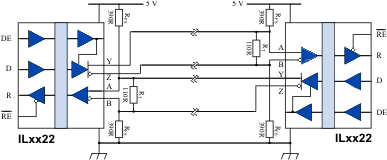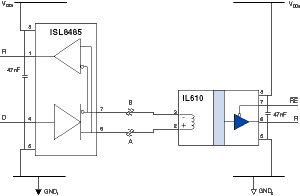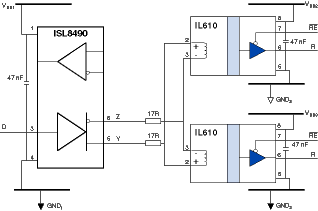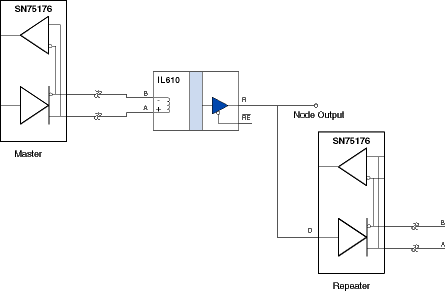| Isolated RS-422
NVE offers a broad line of single-chip isolated RS-422 transceivers.
IsoLoop logic isolators can also be used as part of multi-chip designs to isolate
signals using particular non-isolated transceivers.
Illustrative circuits:
Recommended application bulletins:
NVE’s single-chip isolated RS-422 transceivers include digital- and passive-input versions, and fractional-load versions. Termination resistors can be added to maximize speed and transmission length. Fail-safe resistors guarantee a known state on a terminated bus with no active transceivers. NVE transceivers are available with data rates are up to 40 Mbps. Parts are available in 0.3" and 0.15" 16-pin SOIC packages.
An IL610 can be used as a simple isolated RS-422 receiver. No external resistors are required, and cabling is greatly simplified by eliminating the need to power the input side of the receiving board. The circuit is failsafe because the IL610 is guaranteed to switch to the high state when the coil input current is less than 500 µA. No current-limiting resistor is needed for a single receiver because it will draw less current than the driver maximum. There is also no need for line termination resistors in most IL610 line receiver applications below a data rate of about 10 Mbps because the IL610 coil resistance of approximately 70 Ohms is close to the characteristic impedance of most cables. The IL610 provides 2.5 kVrms isolation (one minute), and 20 kV/µs
transient immunity. The IL610-1 is a unique MSOP isolator for space-critical
boards.
This circuit shows a two-receiver RS-422 network using IL610s. Two 17 Ohm current-limiting resistors prevent two IL610 coils from exceeding the maximum load of the transceiver chip. Placement of the current-limiting resistors on both lines provides better dynamic signal balance.
Simple, low cost, isolated repeater systems can be made with an RS-422 transmitter/receiver pair (or an RS-485 transceiver in drive mode) and an IL610. Repeaters can extend the useful cable length and node count indefinitely, provided the network controller can tolerate the additional propagation delays. |



